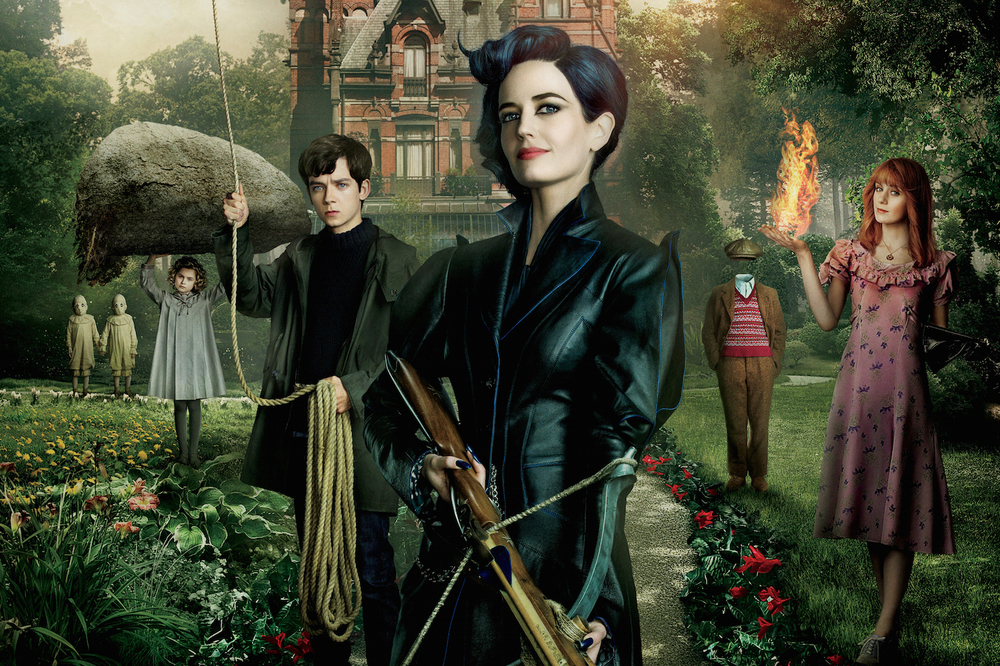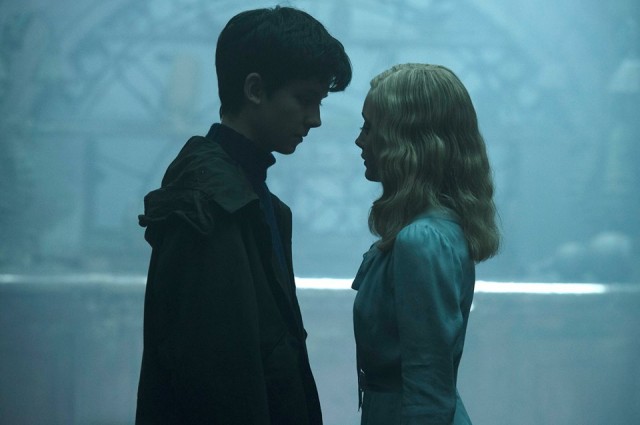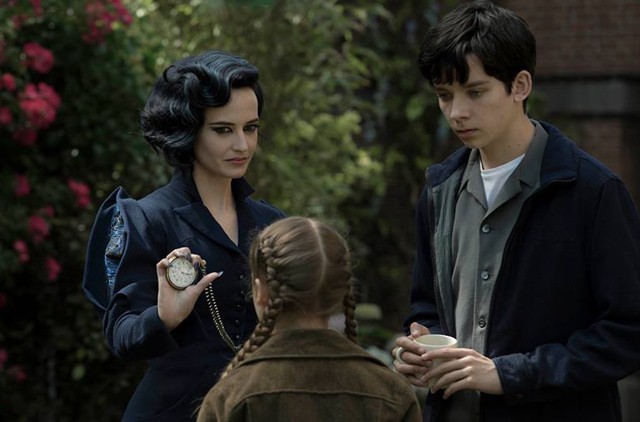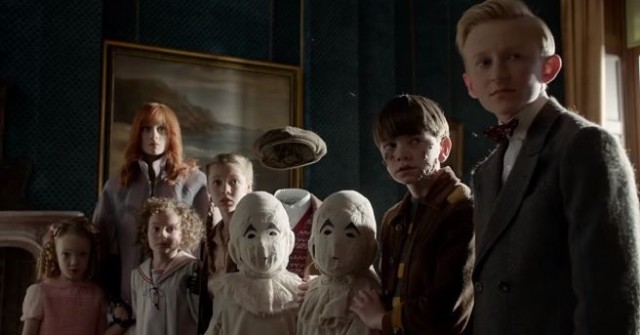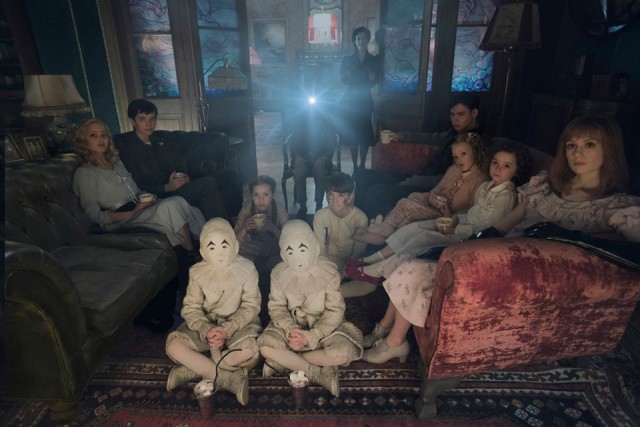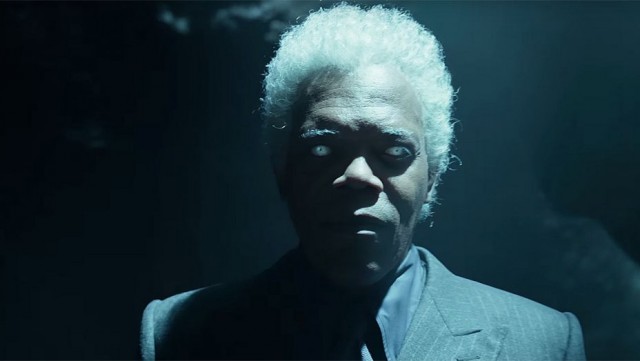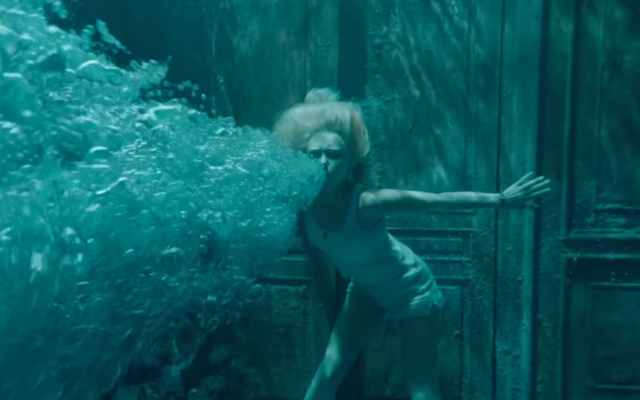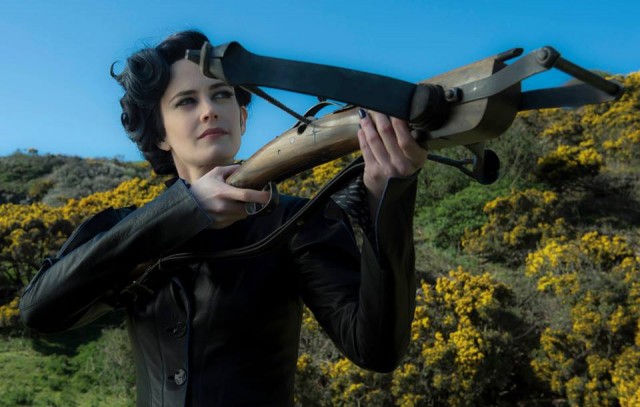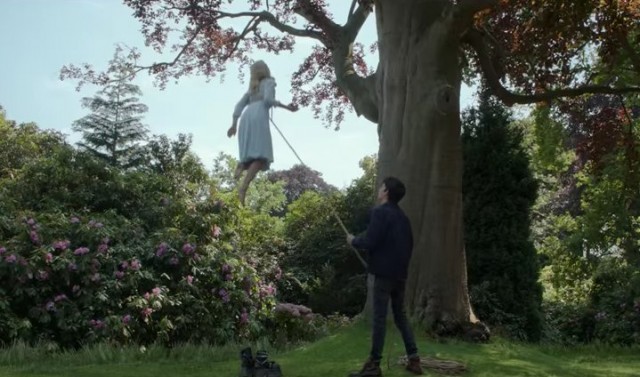Despite the shrinking market around film adaptations of young adult fantasy/sci-fi novels, 20th Century Fox appears to be at least one studio that still firmly believes in them. With Maze Runner: The Death Cure now pushed all the way back to the start of 2018, Fox is left with a hole to fill in their slate for that audience, particularly since that third movie will presumably conclude the current plans for the Maze Runner movie trilogy (though two prequel novels do exist, in case Fox wants to keep that franchise chugging), and that means turning to a similar recent YA fantasy novel, Miss Peregrine’s Home for Peculiar Children, originally published in prose in 2011.
Dumped at the very end of September, after being moved out of a more lucrative Holiday 2016 release window by the studio, Miss Peregrine’s Home for Peculiar Children may be coming out sooner, but it’s also dropping with significantly less fanfare than Fox might have hoped for. Fortunately, this also leaves room for it to be something of a pleasant surprise though, and Miss Peregrine’s Home for Peculiar Children does indeed stand as another decent offering for a September calendar that has defied the month’s shaky cinematic reputation this year.
Like the Maze Runner franchise though, Miss Peregrine’s Home for Peculiar Children is shakier in the story department, leaving its visuals and exotic world of strange, unnatural people to do the heavy lifting for it. This in turn makes any moment where the movie steps away from this fantasy-based world quickly grow tedious as well, despite a solid cast doing their best to keep proceedings entertaining. As a serviceable fantasy flick, Miss Peregrine’s Home for Peculiar Children does its job, especially for a September movie, but it’s not exactly begging to be turned into a big new film franchise either.
Miss Peregrine’s Home for Peculiar Children is headlined by Asa Butterfield’s Jake Portman, an aggressively ordinary young teenager who was brought up on fantastical stories told by his grandfather, Abe, played by Terence Stamp. After a mystery with said grandfather puts Jake on the trail of a strange, peculiar world however, Jake eventually stumbles into a time loop that drops him into 1943, where he finds a house full of super-powered children, led by the kindly Miss Peregrine, played by Eva Green.
Like I said, it’s when the movie focuses on these interesting, unusual mutant-esque characters that Miss Peregrine’s Home for Peculiar Children becomes its most intriguing. The mundane world surrounding this time-looped 1943 setting is very plodding by contrast, and Jake himself is, disappointingly, a somewhat dull protagonist. Asa Butterfield does his best to sell his character’s anguish and fish-out-of-water awkwardness, and he’s at least likable in the part, though he’s also playing the angsty, misunderstood accidental hero that has become quite trite and overdone in many modern movies that are aimed at teens and up. The fact that the writing behind Jake is so weak and derivative further hurts the sequences that take place in the relatable, present-day world, and both Chris O’Dowd and Kim Dickens are sadly also lost in the shuffle, playing forgettable parent characters that are only left to doubt Jake’s convictions, and inevitably be proven wrong, as we’ve also seen with thousands of other parent characters in these types of movies.
Once we’re in Miss Peregrine’s world though, the charm really does leap off of the screen! Eva Green delivers one of the movie’s best performances as Miss Peregrine herself, a perfect mix between charming, whimsical and mighty, existing as sort of a darker version of Mary Poppins. Similarly, the titular ‘peculiar children’ have a lot of heart and personality themselves, making one wish that the movie had simply ditched Jake and his side of things, and simply been entirely about them existing in 1943. That wouldn’t jive with the source novel, of course, but at least it would have made for a slightly more evenly enjoyable movie, rather than occasionally having to take us out of this very interesting world to occasionally go back to a really boring reality.
As for the movie’s villains, they’re decent, if a little disposable and shallow. Led by Samuel L. Jackson’s Mr. Barron, an original character invented for the movie (despite incorporating the backstory of the source novel’s villain), the so-called ‘Wights’, so named for their ghostly forms and eerie white eyes, desire to prey on ‘Peculiar’ children, with ‘Peculiars’ being the movie’s name for people with weird affinities and powers. The Wights exist as passable boogeymen that mostly just lead into a decent climax, and there’s not much else to say about them, with their designs being the most interesting thing about them. The Wights are accompanied by invisible monsters called Hollows as well, which become the justification for Jake’s existence in this fantasy world, when a link between he and them becomes apparent. They’re also just simple monsters though, and this leaves Miss Peregrine’s Home for Peculiar Children once again treading the well-worn ground of many YA fantasy movies before it.
The visual direction and character designs for Miss Peregrine’s Home for Peculiar Children prevent it from becoming a wholly recycled experience, but again, there just isn’t enough here to make viewers want to see these characters re-appear in a sequel. There just isn’t enough interesting or novel elements to them. Everything is simply ‘good enough’, and everything outside of the titular setting feels much less interesting, which undermines the idea of expanding the scope of this world. At least you’ll have fun with the Peculiars, but a more balanced and appealing cast would have helped Fox cultivate this movie into something more than a backdrop for the same old character ideas of other, better movies.
As much as the cast of Miss Peregrine’s Home for Peculiar Children doesn’t always stand out, at least outside of Miss Peregrine and her Peculiars themselves, it’s the storyline that really hurts this movie’s prospects as a potential franchise launcher. Once again, the material in the actual titular home for Peculiar children is great, and if the movie had entirely focused on that setting, it may have been better off. Instead though, reality is clumsily blended with this more interesting fantasy, and rather than make an experience that feels plausible, despite its weird, fantastical flavour, it instead creates an appealing fantastical experience that reality keeps rudely intruding on, which doesn’t really work that well.
Even within the highlight setting of Miss Peregrine’s home however, there’s another big problem that’s frequently evident with this movie; It’s pretty obviously borrowing inspiration from two much more beloved and established movie franchises in particular. On top of drawing obvious parallels between Warner Bros.’ highly successful Harry Potter movies, namely with the secluded school for young, misunderstood children that have unnatural abilities, Miss Peregrine’s Home for Peculiar Children also draws heavily from Fox’s own X-Men movie franchise for the same reason, along with some dialogue about the Peculiars (who are more or less exactly like X-Men’s mutants), practically being lifted wholesale from those movies. This only draws all the more attention to the parts where the storyline feels very dull and derivative, as if it’s a pale imitation of other, better movie franchises.
It also bears repeating that Jake and his life are aggressively uninteresting to boot, which makes the movie’s first act a huge chore. It’s the second act where Miss Peregrine’s Home for Peculiar Children feels strongest, since it’s when we can best soak in the best settings and circumstances that the movie has to offer. The third act and climax is also fairly good, at least offering some decent, vaguely comical action to close things out on, even if the movie purely throws any shred of logic to the wind at that point. Once the tale of Miss Peregrine and her Peculiars are done though, there isn’t much of a sense of wanting more, as I’ve said. If Fox was hoping that this movie would build a fresh, interesting new YA saga to succeed Maze Runner, the story just doesn’t have enough real steam to make that a tantalizing prospect.
Amazingly, Miss Peregrine’s Home for Peculiar Children was directed by Tim Burton. I say amazingly, because you would never know that from looking! Normally, Tim Burton’s familiar, engrossing style is all over his work, but despite being helmed by one of the most visually provocative directors of our generation, Miss Peregrine’s Home for Peculiar Children looks exactly like a slew of other YA fantasy movies. How did Tim Burton make a movie that fails to stand out? Even in Burton’s shakiest works, they’re at least stylishly distinct, even when their storylines are pretty bad!
To be fair though, Burton’s eye for style is not completely wasted here. Burton still manages a nice, surreal charm in the 1943-set world of Miss Peregrine’s Peculiars, and there are some moments of visual direction that really are standout stuff. Where Burton’s touch feels most apparent is with the Wights, which do have a spooky, but mischievous feel that call back to some vintage Burton projects like Beetlejuice. It’s also worth noting that Burton seems to intentionally avoid falling back on visual effects, even if it sometimes works to the movie’s detriment, since it misses the chance to truly sell its bizarre world with a more visually distinct flavour.
It’s also very apparent that Burton’s priorities didn’t lie with the real-world material. It doesn’t feel like the actors are given all that much direction during many of the reality-based scenes, with many of them sounding sleepy and monotone, despite the actors trying to elevate their characters to a point. Like I said, Butterfield at least tries to do what he can with the material that he’s got, but it’s clear that Burton is most interested in a world that the movie only spends so much time in anyway. The direction never feels incompetent or ineffectual, but it also doesn’t help Miss Peregrine’s Home for Peculiar Children in its already uphill quest to stand out from the pack.
Tim Burton almost never directs a movie that isn’t composed by his usual musician companion, Danny Elfman, but Miss Peregrine’s Home for Peculiar Children is one of those movies. Instead of Elfman, the score is composed by Mike Higham and Matthew Margeson, and once again, the soundtrack is really at its best in the world of the Peculiars. The composition actually amps up with a surprisingly slick, modern style in the climax, which is fine, but the strongest tracks in the score yet again seem to be when we’re in the dwelling of Miss Peregrine and her Peculiars. The music is a decent change of pace from the usual Elfman scores in any case (not that those are bad, mind you), and it certainly gets the job done when it comes to immersing you in the movie’s more effective and fantastical moments.
The rest of the audio work is fairly decent, if also pretty unremarkable. Fox’s X-Men movies certainly have a lot more punch than this, as do Warner Bros.’ Harry Potter movies, but what’s here is certainly fine. The sound effects certainly add to the movie’s sense of whimsy, to the point where they could almost feel like they’re appealing to children, with only the Hollows sounding more menacing and scary. There is enough of a sense of power to the Peculiars to make them appealing to adults however, even if, as action-based characters, they feel like lesser versions of similar mutant personalities that clearly inspired them.
Arguably the highlight of Miss Peregrine’s Home for Peculiar Children are its visual effects, even without the sense of more distinct Tim Burton-approved style. Like I said, Burton still manages to create some real standout visual moments in the movie, even if they’re sometimes frustratingly few and far between, and the final battle against the Wights and Hollows in the climax does have enough style to get by. Once again though, where the visuals feel best is in the titular setting, which the movie effortlessly engrosses you into, even if it’s taking pages from a couple of other larger-scale film franchises at times. It also must be stressed that the movie’s wardrobe is truly excellent, and it’s disappointing that the rest of the visuals don’t stand out as much as the costumes, which are the one area where this movie truly feels like it excels among the glut of YA novel adaptations.
Another pleasant surprise with the visuals in Miss Peregrine’s Home for Peculiar Children is the 3D presentation, which is surprisingly good, if not wholly necessary. The 3D cut of the movie does add to the atmosphere in even some of the scenes that don’t involve Peculiars, and some of the Peculiar-driven effects in the second and third acts do feel more captivating and powerful when they’re experienced in 3D. It’s too bad that the rest of the movie isn’t more visually distinct, which might have helped the solid 3D stand out even more, but the 3D presentation is good enough of an upgrade to make this movie’s 3D cut the ideal way to experience it, even if you’ll still get much of the same experience when you watch the movie flat in 2D.
Miss Peregrine’s Home for Peculiar Children is a satisfactory adaptation of a satisfactory novel, and for what it’s worth, it is at least slightly better than Fox’s highly uneven Maze Runner movies. As a potential franchise launcher though, the movie feels wanting, and even if the fairly successful box office returns could see the novel’s sequel be adapted to film next, it’s equally likely that Fox may make this first movie a one-and-done deal.
To that end, there isn’t a whole lot to say about Miss Peregrine’s Home for Peculiar Children, which, like the Maze Runner film franchise, feels like it’s transparently chasing the success of another film franchise, or in this case, two. Further compounding the irony is that Fox is chasing their own success with their X-Men movies here, even if I suppose Lionsgate sort of did the same thing by trying to reverse-engineer another Hunger Games franchise with the ill-fated Divergent saga, even if Divergent did start with subsidiary, Summit Entertainment. It’s like Miss Peregrine’s Home for Peculiar Children only got adapted to the big screen because Fox just couldn’t wait for their in-development New Mutants movie, and that’s hardly a vote of confidence.
Still, Miss Peregrine’s Home for Peculiar Children gets the job done for fantasy fans who want to whet their appetites before this year’s November/December Holiday blockbusters. It’s a lesser and smaller movie than many of those projects will inevitably be, and by the time Doctor Strange and Fantastic Beasts and Where to Find Them have come to theatres, this movie will probably mostly be forgotten to anyone who isn’t already a big fan of the source novel. That’s a shame, since there is charm here, and the visual design at the very least is certainly solid, though at this point, it’s becoming increasingly tougher to disguise movies that are obviously pitched as clones of other movies. Instead of being as pleasantly peculiar as its titular youths, Miss Peregrine’s Home for Peculiar Children too often feels like a simple hodgepodge of cinematic ingredients that we’ve already seen before.

